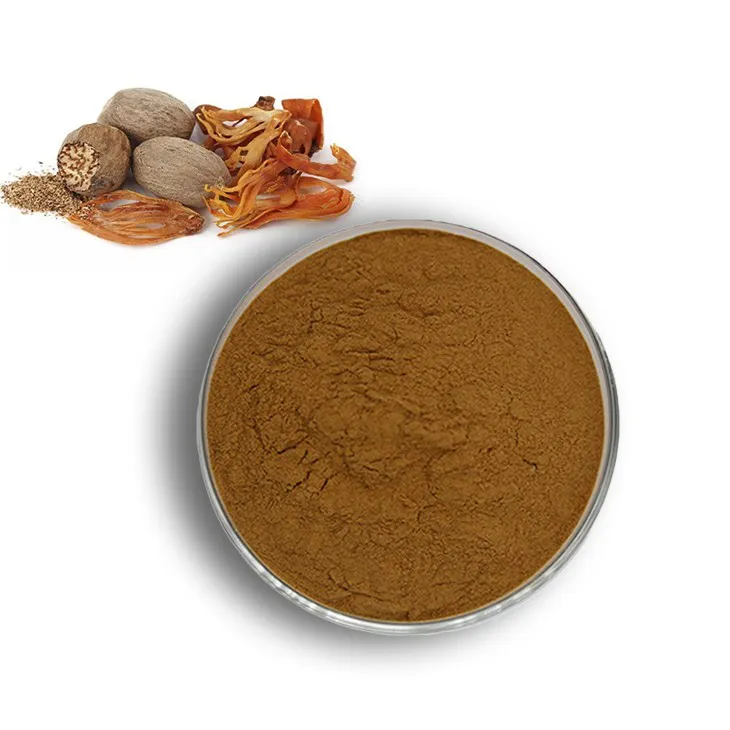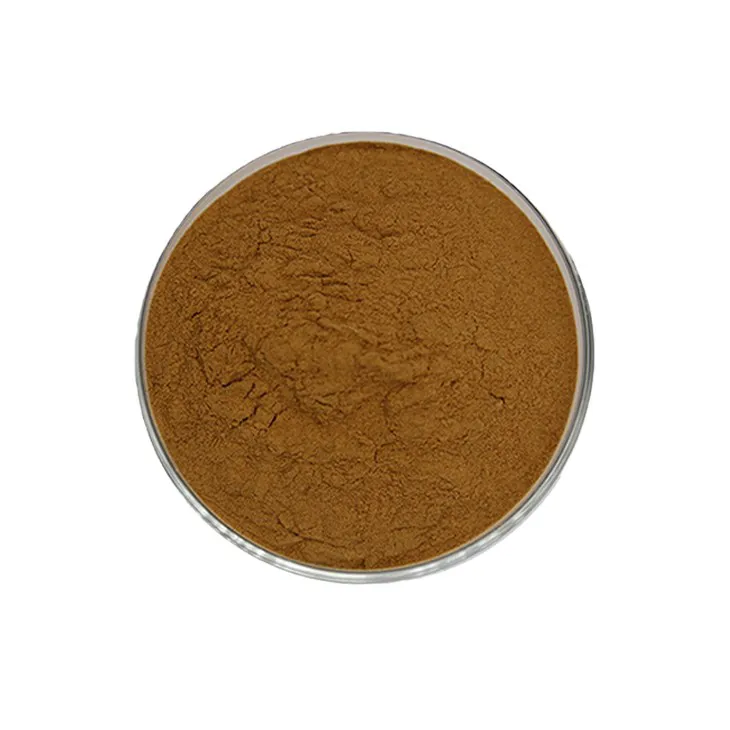- 0086-571-85302990
- sales@greenskybio.com
Nutmeg extract: Is the extract effective for weight loss?
2024-11-13

1. Introduction
In the pursuit of effective weight - loss solutions, many natural substances have come under the spotlight, and Nutmeg Extract is one of them. Nutmeg, a common spice with a long history of use in cooking and traditional medicine, has been hypothesized to possess properties that could aid in weight loss. However, the scientific understanding of its true potential in this regard is still evolving.

2. Components of Nutmeg Extract
2.1 Myristicin
One of the key components in Nutmeg Extract is myristicin. This compound has been the subject of various studies due to its potential biological activities. Myristicin is known for its antioxidant properties. Antioxidants play an important role in the body as they can help combat oxidative stress, which is associated with many health problems. In the context of weight loss, oxidative stress can disrupt normal metabolic processes, and by reducing it, myristicin may potentially contribute to a more favorable metabolic environment. However, the direct link between myristicin's antioxidant activity and weight loss is yet to be firmly established.
2.2 Eugenol
Eugenol is another significant component present in nutmeg extract. It has anti - inflammatory properties. Inflammation in the body can interfere with normal hormonal balance and metabolic function. Chronic inflammation has been linked to obesity and related metabolic disorders. Eugenol may help in reducing inflammation levels in the body. For example, it can potentially modulate the activity of certain immune cells that are involved in the inflammatory response. While this anti - inflammatory effect is promising in terms of overall health, its specific impact on weight loss remains unclear. There may be an indirect effect, such as improving insulin sensitivity through reducing inflammation, which could potentially influence body weight.
2.3 Other Compounds
Nutmeg extract also contains other compounds such as safrole (in small amounts). These compounds, although present in relatively lower quantities, may also contribute to the overall effects of the extract. However, safrole has been a matter of some concern due to its potential toxicity at high doses. Overall, the complex mixture of compounds in nutmeg extract makes it challenging to isolate and determine the exact contribution of each component to weight loss.
3. Scientific Research Findings on Nutmeg Extract and Weight Loss
3.1 Animal Studies
Some animal studies have been conducted to explore the potential of nutmeg extract in weight loss. In these studies, rodents were often used as experimental models. For instance, in one study, rats were fed a diet supplemented with nutmeg extract. The results showed that the rats in the nutmeg - supplemented group had a slightly lower rate of weight gain compared to the control group. However, it is important to note that these animal models may not perfectly mimic human physiology. The differences in metabolism, diet composition, and lifestyle between animals and humans can limit the direct translation of these findings to human applications.
3.2 In vitro Studies
In vitro studies, which are experiments conducted in test tubes or cell cultures, have also provided some insights. For example, studies on human fat cells (adipocytes) in culture have investigated the effect of nutmeg extract components. Some findings suggest that certain compounds in nutmeg extract may be able to influence the metabolism of fat cells. They may affect processes such as lipolysis, which is the breakdown of fats stored in adipocytes. However, these in vitro results need to be further validated in vivo (in living organisms) as the conditions in a cell culture do not fully represent the complex environment of the human body.
3.3 Human Studies
Human studies on nutmeg extract and weight loss are relatively scarce. One small - scale study involved a group of overweight individuals who were given a nutmeg extract supplement for a certain period. The study measured parameters such as body weight, body mass index (BMI), and body fat percentage. While there were some indications of a decrease in body weight and body fat percentage in the group taking the supplement, the study had several limitations. The sample size was small, and there was a lack of a proper control group that accounted for factors such as diet and exercise. As a result, it is difficult to draw conclusive evidence from this study regarding the effectiveness of nutmeg extract for weight loss in humans.
4. Interaction with the Body's Metabolism
4.1 Influence on Energy Expenditure
One possible way nutmeg extract could contribute to weight loss is by influencing energy expenditure. The body's basal metabolic rate (BMR) is the amount of energy expended at rest. Some theories suggest that certain components in nutmeg extract may be able to slightly increase BMR. For example, if the extract can stimulate the activity of mitochondria (the powerhouses of the cells), it could potentially lead to an increase in the rate of cellular respiration, which in turn would increase energy expenditure. However, current evidence for such an effect is very limited.
4.2 Impact on Appetite
Another aspect of metabolism that nutmeg extract may interact with is appetite. There are some indications that it could have an impact on appetite regulation. It may act on the hormones and neural pathways involved in hunger and satiety. For example, it could potentially increase the release of hormones such as leptin, which signals satiety to the brain. If this is the case, it could lead to a reduction in food intake. However, more research is needed to confirm whether nutmeg extract can actually have a significant and consistent effect on appetite in humans.
4.3 Effects on Fat Metabolism
Nutmeg extract may also play a role in fat metabolism. As mentioned earlier, in vitro studies have shown that some of its components can affect lipolysis in adipocytes. In the body, if the extract can enhance the breakdown of stored fats, it could potentially lead to a reduction in body fat levels. Additionally, it may also influence the way the body processes and stores dietary fats. For example, it could affect the activity of enzymes involved in fat synthesis or transport. However, the complex regulatory mechanisms of fat metabolism in the body make it difficult to fully understand how nutmeg extract may interact with these processes.
5. Possible Mechanisms Behind Weight - Loss Benefits
5.1 Modulation of Hormonal Balance
Hormonal balance is crucial for maintaining a healthy body weight. Nutmeg extract may potentially modulate the levels of various hormones involved in metabolism. For example, it could influence insulin levels. Insulin is a key hormone in regulating blood sugar levels and also plays a role in fat storage. If nutmeg extract can improve insulin sensitivity, it could help the body better regulate blood sugar and prevent excessive fat storage. Additionally, it may also affect hormones such as thyroid hormones, which are involved in regulating the body's metabolic rate.
5.2 Anti - oxidative and Anti - inflammatory Effects
As previously discussed, the antioxidant and anti - inflammatory properties of nutmeg extract components may contribute to its potential weight - loss benefits. By reducing oxidative stress and inflammation, the extract may create a more favorable internal environment for normal metabolic processes. For example, a less inflamed body may have better functioning of the endocrine system, which is involved in regulating hormones related to weight management. Also, reduced oxidative stress can protect cells from damage, which may be beneficial for the proper functioning of organs involved in metabolism such as the liver and pancreas.
5.3 Influence on Gut Microbiota
6. Associated Risks or Limitations
6.1 Toxicity Concerns
As mentioned earlier, nutmeg contains safrole, which can be toxic in high doses. While the amount of safrole in nutmeg extract is usually small, excessive consumption of nutmeg extract could potentially lead to toxicity. Symptoms of nutmeg toxicity can include nausea, vomiting, dizziness, and in severe cases, hallucinations and seizures. Therefore, it is important to ensure that any use of nutmeg extract for weight loss or other purposes is within safe dosage limits.
6.2 Lack of Standardization
There is currently a lack of standardization in the production and formulation of nutmeg extract products. Different products may contain varying amounts of active components, which makes it difficult to determine the appropriate dosage and predict the effectiveness. Without proper standardization, it is also challenging to conduct reliable scientific studies on the extract's weight - loss properties.
6.3 Interaction with Medications
Nutmeg extract may interact with certain medications. For example, it may interfere with medications used to treat diabetes or hypertension. Since it may have an impact on blood sugar levels and blood pressure regulation, it is crucial for individuals taking these medications to consult their healthcare provider before using nutmeg extract. Additionally, it may also interact with medications that are metabolized in the liver, as some components of the extract may affect liver enzyme activity.7. Conclusion
In conclusion, while nutmeg extract shows some potential in relation to weight loss based on its components, scientific research findings so far are inconclusive. The possible mechanisms through which it could contribute to weight loss, such as its influence on metabolism, hormonal balance, and gut microbiota, are promising areas for further research. However, the associated risks and limitations, including toxicity concerns, lack of standardization, and potential interactions with medications, cannot be ignored. More well - designed human studies are needed to determine whether nutmeg extract can be an effective and safe option for weight loss. Until then, individuals should be cautious when considering using nutmeg extract for weight loss purposes and should always consult a healthcare professional.
FAQ:
1. What are the main components in nutmeg extract?
Nutmeg extract contains various components. Some of the key ones include essential oils, such as myristicin, elemicin, and safrole. These compounds contribute to the characteristic aroma and flavor of nutmeg. Myristicin, for example, is a major component that has been studied for its potential biological activities.
2. What does scientific research say about nutmeg extract for weight loss?
Currently, scientific research on nutmeg extract for weight loss is limited. Some in - vitro and animal studies suggest that certain components in nutmeg extract may have an impact on metabolism. For instance, it might influence lipid metabolism or have an effect on enzymes related to energy expenditure. However, these findings are far from conclusive and more research, especially human trials, are needed to establish a definite link between nutmeg extract and weight loss.
3. How might nutmeg extract interact with the body's metabolism?
It is hypothesized that nutmeg extract could interact with the body's metabolism in several ways. Some components may affect the activity of certain enzymes involved in fat breakdown or energy production. For example, it could potentially enhance the activity of enzymes that break down fatty acids, which would increase the rate of fat metabolism. However, this is still speculative as more research is required to fully understand these interactions at a physiological level.
4. Are there any potential risks associated with using nutmeg extract for weight loss?
Yes, there are potential risks. Nutmeg contains compounds like myristicin which, when consumed in large amounts, can be toxic. High - dose or long - term use of nutmeg extract may lead to symptoms such as nausea, dizziness, and in severe cases, more serious neurological problems. Additionally, it may interact with medications or pre - existing health conditions, so it is important to consult a healthcare provider before using nutmeg extract for weight loss.
5. What are the limitations of using nutmeg extract for weight loss?
One major limitation is the lack of comprehensive scientific evidence. As mentioned earlier, most of the research is in its early stages or has been done in non - human models. Another limitation is that individual responses to nutmeg extract can vary greatly. Factors such as genetics, diet, and overall lifestyle can influence how the body responds to the extract. Also, the extract's potential effects on weight loss may be relatively small compared to established weight loss methods like diet and exercise.
Related literature
- The Chemical Composition and Potential Health Benefits of Nutmeg Extract"
- "Nutmeg Extract: In - vitro and Animal Studies on Metabolism"
- "Toxicity of Nutmeg and Its Components: A Review"
- ▶ Hesperidin
- ▶ Citrus Bioflavonoids
- ▶ Plant Extract
- ▶ lycopene
- ▶ Diosmin
- ▶ Grape seed extract
- ▶ Sea buckthorn Juice Powder
- ▶ Fruit Juice Powder
- ▶ Hops Extract
- ▶ Artichoke Extract
- ▶ Mushroom extract
- ▶ Astaxanthin
- ▶ Green Tea Extract
- ▶ Curcumin
- ▶ Horse Chestnut Extract
- ▶ Other Product
- ▶ Boswellia Serrata Extract
- ▶ Resveratrol
- ▶ Marigold Extract
- ▶ Grape Leaf Extract
- ▶ New Product
- ▶ Aminolevulinic acid
- ▶ Cranberry Extract
- ▶ Red Yeast Rice
- ▶ Red Wine Extract
-
Curcuma Longa Extract/Turmeric extract
2024-11-13
-
Chasteberry Extract
2024-11-13
-
Troxerutin
2024-11-13
-
Elderberry Extract
2024-11-13
-
Astaxanthin
2024-11-13
-
Shikone Extract
2024-11-13
-
Garcinia Cambogia Extract
2024-11-13
-
Saponin Extract
2024-11-13
-
Camu Camu Extract
2024-11-13
-
Yellow Pine Extract
2024-11-13





















